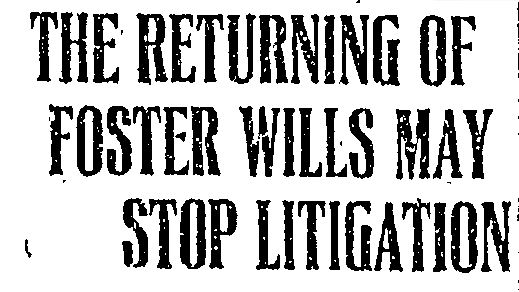This RecordClick genealogist likes a good ancestry story. And sometimes the genealogist can find that a will and its probate make for a darn good tale. Take the case of Florence Foster Jenkins, who is recently back in the public eye with the film starring Meryl Streep and Hugh Grant.
Most every genealogist will find that Mrs. Jenkins was a character. Her singing career was, to put it tactfully, quite unusual. Though she died in 1944, this genealogist remembers stories and recordings years that I heard years later in my childhood. Her voice was indeed memorable – even to a five-year-old pre genealogist.
One of the reasons Florence Foster Jenkins succeeded in her musical career was because of her wealthy father, Charles Foster, and his fortune. This story is a research lesson for every genealogist. It is a story about a will.
Charles Foster maintained a successful law practice in Wilkes-Barre, Pennsylvania. He married Mary Jane Hoagland and the couple had two daughters, Florence, born in 1868, and Libby, born several years later. Libby died before her tenth birthday; leaving the philanthropic Charles Foster focused most on the welfare of his wife and surviving daughter.
When it came time to marry, Florence Foster married a Dr. Jenkins before her 20th birthday. Sadly, it was not a good match, especially after she learned she had contracted syphilis from her philandering husband. She was divorced but the genealogist will see from medical records that she was left to battle the disease. At that time, syphilis had no cure.
Because of her father’s good financial management and his will, her huge net worth, shall we say, hit a high note.
When Charles Foster died in 1909, there was an intact will.
Yet, after his death, this will mysteriously disappeared. No one could locate it.
With a personal estate valued at $100,000 and real estate valued at $250,000—which was an extraordinarily high net worth for that time–,extended family members began to surface looking to make a claim on the estate. To protect their interests, Mrs. Mary J. Foster and daughter Florence Foster Jenkins requested that the court appoint an administrator to handle the estate and wealth.
Family members contested the handling of the estate and the case was set to go to trial in September 1910. Then, in October 1910, a story in the Wilkes-Barre Times Leader about the case began:
“Although it’s stealing and its return still remains a mystery, the will of Hon. Charles D. Foster, late of this city was admitted to probate today…”
Mysteriously. The will was found! (Isn’t this is the wish of every genealogist who runs into a lost will situation…)
Charles Foster wanted his wife and daughter to maintain the lifestyle to which they were accustomed. First, however, there were debts to be paid and individuals to be remembered with gifts and money. Then came wife Mary J. Foster and daughter Florence Foster Jenkins. The income from the estate was to be divided evenly between the two with the survivor receiving the entire estate. After the death of the survivor, Charles had a plan for disposing of what was left.
Mary J. Foster died in 1930. With the additional financial resources that passed from her mother’s share of the estate to her, Florence Foster Jenkins was able to maintain the lifestyle she lived and loved—and continued her beloved music explorations.
Wills and probate may seem daunting to the family seeking a family history. The legal language takes time to learn and the logic of the process may not make sense to many.
When you hire a genealogist at RecordClick, you get professional genealogy researchers who understand the court system and know where to look for—and interpret– the records. Our ancestry specialists will also help you tell the family history story.







